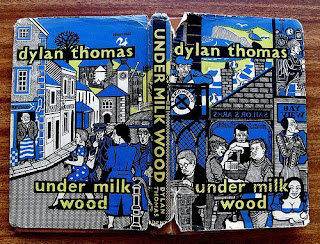 In my eclectic reading recently, I came across Dylan Thomas' essay on his poetics titled "Notes on the Art of Poetry." It brought to mind one of the reasons that I am so entranced by poetry, and especially the delivery of it to the audience.
In my eclectic reading recently, I came across Dylan Thomas' essay on his poetics titled "Notes on the Art of Poetry." It brought to mind one of the reasons that I am so entranced by poetry, and especially the delivery of it to the audience.  It is hearing him read, hearing his delivery of the sound and music of the language, that opens the way to an understanding of the meaning of his words and the ideas these words express. "I am a painstaking, conscientious, involved, and devious craftsman in words, however unsuccessful the result so often appears." Words and the way they are used, new expressions shaped from old, all may look odd on the page but resound like church bells in the air around.
It is hearing him read, hearing his delivery of the sound and music of the language, that opens the way to an understanding of the meaning of his words and the ideas these words express. "I am a painstaking, conscientious, involved, and devious craftsman in words, however unsuccessful the result so often appears." Words and the way they are used, new expressions shaped from old, all may look odd on the page but resound like church bells in the air around. Thomas is by no means the only poet who should be heard before he is read. I had but a faint grasp on the poetry of bp nichol before I heard him read it aloud. The dub poets need the voice to convey what the page can not. Any good presenter of his/her own poetry must add something more than can be found displayed in black text on white paper.
Thomas is by no means the only poet who should be heard before he is read. I had but a faint grasp on the poetry of bp nichol before I heard him read it aloud. The dub poets need the voice to convey what the page can not. Any good presenter of his/her own poetry must add something more than can be found displayed in black text on white paper.
Probably because I come from a people who relied on public recitation as a form of community entertainment, on "foardragen," poetry and its presentation aloud mean so much to me. But that's not the only reason. I too love the sound of words; at times I don't care whether or not they mean. In a way it's like opera: who cares what banalities the words may mean, they sound so marvelous!
When I remember Martin Luther King proclaiming, "Let freedom ring!" I hear in my own mind, "Let poetry ring!" Sometimes freedom and poetry are expressions of the same thing.
 Let's keep the words and language ringing.
Let's keep the words and language ringing.
No comments:
Post a Comment